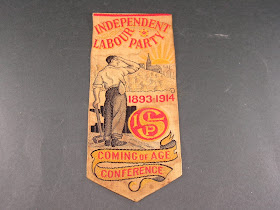
Richard Bell was with Kier Hardie the first elected Labour Members of Parliament at the General election of 1900, however while Hardie has become a household name little is know of Richard Bell.
RICHARD "Dick" Bell ( 1859 - 1930 ), M.P. and trade union leader ;
Born 27th November 1859 at Penderyn , Brecknock, Brecon , son of Charles stone quarrier) and Ann Thomas .
His paternal grandparents were Scots who moved from Lincoln to farm at the Pantmawr, Ystradfellte . Shortly after 1860 his father, a quarryman, joined the Glamorgan police force and went to Merthyr Tydfil, where Richard had his rudimentary early education at a British School, but became a fluent welsh speaker.

Aged just thirteen Bell began work as an office boy in the Cyfarthfa iron-works at Merthyr Tydfil , then at Dowlais Ironworks before returning to his old employers as a shunter with locomotives. Bell's great ambition was to be be an engine driver. In 1876 Bell entered the employment of the Great Western Railway (GWR) company and was stationed at Pontypool Road, working his way up through the portering grades , where he joined the Amalgamated Society of Railway Servants - railway union . In 1886 he was transferred to Swansea and became an under guard, and there, finding no union activities, he established a branch of the A.S.R.S. in 1887. An unofficial strike on the North Eastern Railway early in 1897 provided the occasion of Bell's promotion general secretary on a pro tem basis.
In 1899 a resolution was carried at the ASRS national conference calling for the establishment of a Labour Representation Conference in February 1900, this resolution being moved by James Holmes, the West of England organising for the ASRS.
Two episodes of outstanding importance occurred during Richard Bell's tenure of office at the ASRS. The first was the Taff Vale dispute in 1900 , when, because of an unofficial strike among railway workers, the company sued the union and obtained £23,000 damages; this led to a change in trade union law.
The second was the famous Osborne case, when a branch secretary of the union queried the validity of its rules regarding the political levy. The case was finally taken to the House of Lords and decided against the union. The consequence was the 1913 Act , which permitted unions to levy a political toll on their members.
Bell will no doubt chiefly be remembered for his resistance to the efforts of those who wished to establish an autonomous Labour Party. In 1900 he was elected Lib-Lab M.P. for Derby boroughs, the first railway worker to enter Parliament .
He was one of the four trade union members of the joint committee which drew up the draft constitution of the Labour Representation Committee (L.R.C. ).
When that committee was established in 1901 he became its first treasurer , and its chairman in 1902-3 . Nevertheless, at the Newcastle conference in 1903 he opposed the adoption of a redrafted constitution which sought to create a new self-governing Labour Party .
Bell was also a supporter and for a time vice chairman of the National Democratic League, a curious hybrid political grouping which for some years was something of a rival to the independent Labour Party, working closely with W.C. Steadman in opposition to the ILP
In 1904 Richard Bell became president of the Trade U
nion Congress .
At the 1906 General election Bell was again backed by the ASRS and Derby Trades Council but not the LRC, he was re-elected as a ‘
Lib.-Lab along with Liberal Sir Thomas roe in Derby double member constituency.
Meanwhile, back at the ASRS Union, the all-grades agitation of 1907 led Bell to speak out against growing militancy of the union members, while his position was supported by the right wing press it w
as increasingly at odds with the ASRS Executive, ASRS MP's Walter Hudson (Newcastle), George Wardle (Stockport) and Derby Trades Council.
As a result of the recriminations about his stance on the strike and his alleged lack of commitment to the Derby consistency, Bell resigned his seat and his trade union office in 1910 .
Bells successor as Labour MP for Derby was fellow Welshman and ASRS official Jimmy Thomas, later General Secretary of the National Union of Railwaymen (who would later end his career in disgrace as a member of the National Coalition government)
He then undertook an administrative post at the
Board of Trade in connection with the establishment of labour exchanges under the unemployment section of the National Insurance Act . This was later transferred to the Ministry of Labour . In 1907 he had been made a J.P. for the county of Middlesex . Bell was elected as a member of Southgate Urban District Council in 1922 and was Chairman 18
25-1926, retiring in 1929.
Richard Bell died at his home 19 Derwent Ro
ad, Palmers Green on May Day (1st May) 1930.
The funeral took place 5th May 1930 at Southgate Cemetery where John Burns and G. N. Barnes gave the graveside tributes.
NOTE
ASRS railway workers union sponsored MP's
G. J. Wardle MP (Stockport) and W. Hudson MP (Newcastle)

































